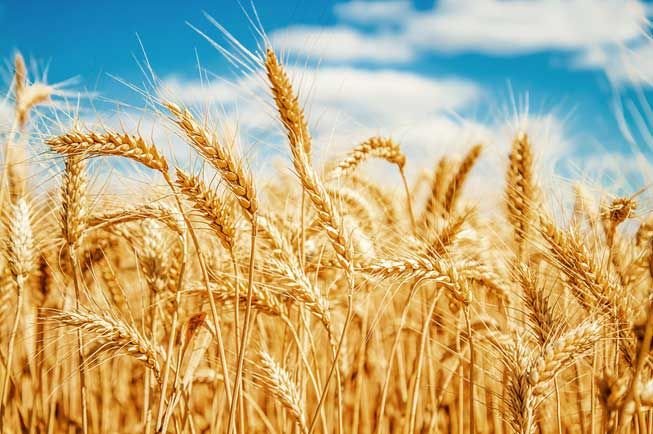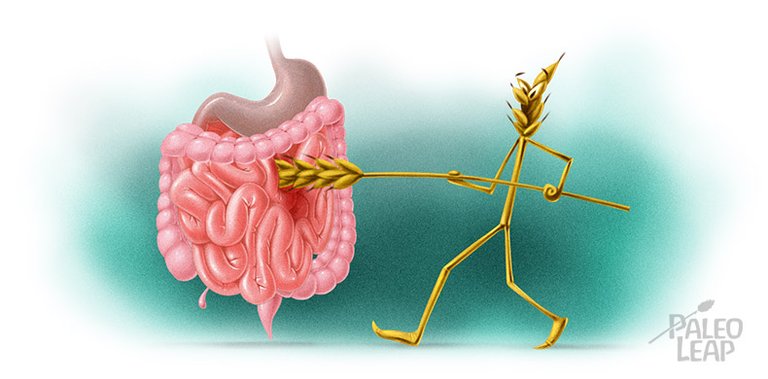Hello my steemit friends,

In today's edition of IMPROVING HEALTH OF STEEMIANS, I want to talk with you about Gluten intolerance.
Gluten intolerance is one of the most common food intolerances today. It is the sensitivity of the digestive system, but also of the entire organism to the gluten protein, which is primarily found in wheat, rye, barley and oats.
Hybridization resulted in new types of wheat whose influence on human health was not checked.
It is little known that there are different types of gluten intolerance. Numerous studies have shown that gluten is a culprit for various conditions and diseases, from neurodegenerative to autoimmune diseases.
The blood tests are not 100% correct so an individual test and a gluten-free diet are required for determination of gluten intolerance.

DECONSTRUCTING WHEAT
Wheat is known for its adaptability to the environmental conditions. The first wheat, grown around 3300 BC was Einkorn. It had a simple genetic code of 14 chromosomes.
For thousands of years it was mixed with various herbs, later in laboratories, which resulted in new varieties with more and more chromosomes. Contemporary commercial production is occupied with higher yields, disease resistance, lower production costs and massive production of quality goods. That is why today's wheat is so biochemically modified that our body has an immune reaction to gluten.
Wheat starch is considered to be a complex carbohydrate, but it contains 75% branched amylopectin-A polymer which rapidly converts into the glucose and absorbs into the bloodstream. Therefore, it is responsible for the wheat influence on the raise of the blood sugar .

It is a super carbohydrate that increases blood sugar more than beans, fried potatoes and chocolate. In addition, wheat has the effect of similar to morphine (contains addictive substances and induces overeating), with the tendency to raise the blood insulin.
GLUTEN INTOLERANCE
Gluten is a plant protein that allows storage of carbon and nitrogen. It is a combination of two types of proteins:
Gliadin
Glutenins
Gluten intolerance has developed due to their actions, and gluten in food causes the following types of intolerance:
- Celiac disease
- Gluten allergy
- Non-Celiac gluten sensitivity
- Bowel permeability in autoimmune diseases

CELIAC DISEASE
Celiac disease is the only conventionally accepted gluten intolerance. It is an autoimmune disease that can occur in genetically predisposed people where the ingestion of gluten leads to inflammation of the small intestine. This reduces the absorption of nutrients (micro-nutrients and macro-nutrients) and a deficit is created.
It is determined by a blood test that will show antibodies on Gliadin and by biopsy to confirm bowel damage.
Symptoms include:
- exhausting cramps in the abdomen
- diarrhea
- sudden weight loss
- chronic fatigue
- anemia

GLUTEN ALLERGY
Allergies or anaphylactoid reactions are caused by other proteins, such as ɑ-amylase, thioredoxin, glyceraldehyde-3-phosphate dehydrogenase, etc.
Exposure to the above mentioned proteins causes the following symptoms:
- asthma
- rash - atopic dermatitis and urticaria
- WDEIA-anaphylaxis (wheat-dependent exercise-induced anaphylaxis) -clinically characterized by anaphylactic reactions ranging from urticaria and angioedema to dyspnoea, hypotension and collapse.

NON-CELIAC GLUTEN SENSITIVITY
The human body has no enzymes for the degradation of gluten-derived chains to individual amino acids. That's why the immune system detects it as an intruder and creates antibodies. It is important to emphasize that gluten-like proteins are similar to human proteins that are building tissue. Antibodies do not have the ability to differentiate them so they attack the normal tissue. That is why people develop autoimmune diseases such as :
- Type 1 Diabetes
- Lupus
- Hashimotov thyroiditis
- psoriasis
GLUTEN FREE DIET
Gluten-free diet is no small challenge but it is necessary for the the normal function of the body. People with diseases mentioned above needs it because of the excessive side effects and aggressive symptoms cause by food with gluten.
By eating gluten-free food, your body will not lose key nutrients and also it does not mean that you will lose weight.
Some people do lose weight while others gain a few pounds, thinking they can eat unlimited just because they eat "healthy."
If you want to reduce gluten consumption you will need to throw out much more food than you initially thought. Gluten is also found in other foods, not just cereals. Try to find food labeled 'GLUTEN FREE'.

images source:google image search
Nice post @doctorcro . Gluten free diet is the key in these conditions. and the most diagnostic feature is -> +ve serology, intestinal villous inflammation and improvement in the villous biopsy after gluten free diet, isnt it?
Thank you :) It is, but i agree that diet is the key to everything. People need to understand that without it, there is no improvement.
I honestly didn't know about these things until I read your post. I don't think my body has a problem with gluten right now, but I will still probably consider cutting back. ^^
But be prepared for it. Because, a lot of food contains Gluten and its hard to cut back. I also fail from time to time. :))
Hahaha! There will probably some that I cannot resist. To be honest, I really don't know what I'm gonna have to cut back on. I will see what will happen when I visit the grocery store again. XD
The same wheat that many diabetic patients consumed more than anything increases blood sugar more than beans and plantain. Wish I new this years back, but thanks to you @doctorcro I have learned something valuable today.
I'm glad that I helped someone :)
This is a very informative post.
I guess you are a nutritionist. 💯
A doctor :)
I just found your profile and I love your Improving Health of Steemians posts. Keep them coming!
Great post, very informative. I thought for a while I had a gluten intolerance but went for almost 6 months gluten-free. I then started to slowly introduce gluten again into my diet and did not have any symptoms.
I will:) Just be careful, if you start developing symptoms again, go to your doctor :)